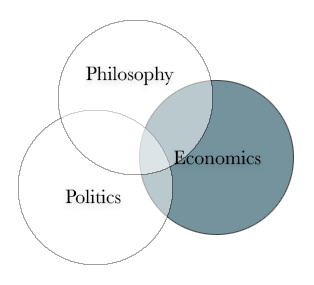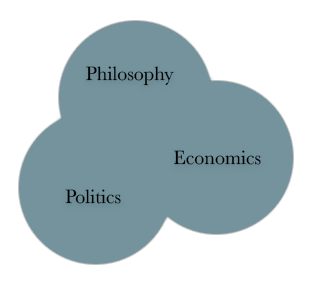How to Major in Philosophy, Politics, and Economics
Andrew M. Bailey
Overview
I've spent the last three years advising students about all things Philosophy, Politics, and Economics (PPE) at Yale-NUS College. My goal here is to compile some useful things I've learned along the way. The treatment is abstract -- more about strategy and approach than about, say, when to take Intermediate Micro or where to study abroad.
PPE is nearly always the largest major at Yale-NUS. I will not, therefore, try to convince you to major in PPE. You probably already have a hunch about whether that's the thing for you. I will try to articulate, though, what I see as particularly valuable or interesting in the major. In short: PPE is integration. I leave it to you to apply any insight here to your own peculiar situation.
What PPE is not
Let's start at the beginning. PPE is not a triple major. We don't do that at Yale-NUS. We don't even do double majors. In the hands of some students it can feel closer to a triple minor: very wide but very shallow. That is not a path I recommend. And students tend to instinctively know this isn't right, after a full year in our wide but sometimes shallow common curriculum.
Think of a Venn diagram, with circles for disciplines. Let dark ink represent deep engagement or expertise. Here is what a major in Economics might look like:

With that image in mind, it might be tempting to major in PPE and so to either fill all the circles with dark ink (a triple major):

Or to fill them all with light ink (a triple minor):

These strategies are, I submit, impossible (in the first case) or frustrating (in the second). There is better way.
Intersections
I think PPE shines at the intersections. The happiest PPE students and alumni find moments of interaction between their interests in Philosophy, Politics, or Economics and push right where those interests meet. The resulting Venn diagram is neither light nor dark throughout. Its distribution of ink is, rather, punctuated at intersections:

Intellectual Arbitrage
I'll briefly offer a model of how this might be valuable, and then suggest some practical strategies for PPE majors interested in actually pulling this off.
My model has it that PPE is a site for intellectual arbitrage. Specialised knowledge and skill can be easily undervalued in a given domain due to high supply and low demand. Philosophers are unimpressed if you can prove second order logic is incomplete. Economists know that demand curves slope down, and you are unlikely to earn the admiration of an economist by being able to do calculus. Many political scientists know loads about statistics or a given constitutional structure; you'll get few accolades from them by reciting the correct definition of a p-value or wisely noting something about institutional design.
But in another context, the very same knowledge or skill could be a rare and precious thing. There are plenty of philosophers who couldn't plot a demand curve if you paid them and haven't a clue why political parties tend to do what they do. I'll wager many economists couldn't articulate the important distinction between intrinsic and non-instrumental value or prove that second order logic is incomplete. And so on -- you can probably think of more examples yourself. Here's the point. These differences in the supply of knowledge across fields involve predictable gaps in price.
Gaps like this are often inefficient. The thing to do is to profit -- to reap unharvested intellectual crops -- by closing them. Sometimes, for example, the curves economists care about matter to philosophy -- as in a theory of justice centred around the boundaries of rational risk tolerance. Sometimes philosophers in distant spaces or times can offer insight into contemporary institutional design. And so on.
As a PPE major, you are poised to exploit these gaps in price by exporting knowledge from a market where it is oversupplied and undervalued to a market where it is a rare and precious thing. You can find insights and connections at these intersections and so make intellectual progress. This is good for you (a capstone, a degree) and good for the world (knowledge).
Strategy
This is all well and good. But how, you might ask, do I do this? The question is a good one. After all, if you ask the average philosopher how a lesson in value theory related to what you learned about utility functions in yesterday's Micro lesson, you might just get crickets. And it's not just the philosophers who may discourage questions at the intersections. Plenty of political theorists are avowed Marxists but don't seem to know why economists reject nearly everything Marx ever said -- and how modern price theory fits into all that. And if you ask an economist which outcome is morally best or whether we should pursue it, or what utilities we ought to have, she'll likely give a formally interesting answer that avoids the normative substance of your query.
I'm afraid I have some bad news. Working at these intersections is hard. We offer few modules that explicitly speak to them, which means you have to do this on your own time.
But I have good news too. You have a mind. You have a huge variety of modules at your disposal that cross-list to the PPE major. And you have some time to think about things with peers and with PPE faculty who are deeply concerned about integrating the major's constituent disciplines.
Here is one tool I recommend. Anytime you're in a class and want to ask one of these odd little "intersection" or "integration" questions, go ahead and ask it. But know that you may well be shut down or brushed aside. That's fine. Write down your question. Keep an intellectual diary of these thoughts. It will grow over time. Consult your library of questions every once in a while, and see what patterns emerge. Is there a particular intersection that tends to grab your interest, for example? Those patterns indicate that seeds are nearby: insights that can grow into full ideas when given enough attention. When capstone season rolls around, your stock of questions and seeds can guide you towards a topic and method that will keep you curious and happy for an entire academic year.
PPE majors pick a primary, a secondary, and a tertiary field. If you do the bare minimum for the major, you could finish with only four modules in your primary field. For some, that is enough. My experience as an advisor suggests that a good many students will long for more, though -- they want to drill down a bit more. Is that you? If so, take a few extra electives in your primary area -- beyond those required to complete the major, I mean. That move has an opportunity cost: in taking that extra Philosophy module you'll forego, say, Introduction to Oil Painting or Python. Is that a price you're willing to pay? Think about it.
Here is another tool for your consideration. Yale-NUS is small. It is very small. That means we don't launch all that many modules and that it can be hard to get a spot in the more popular ones. But our weakness is our strength. This is a college where you can know and be known. Take advantage of that. Meet with your professors in office hours and share with them your questions and idea seeds. Classroom time can feel constrained and fast-paced; there is an agenda to cover and an audience. But office hours are your chance to relax a bit, explore beyond the boundaries of a syllabus, and try out new ideas. Give it a shot and see what happens.
Capstone

A word about writing a PPE capstone. This is your chance to develop your own ideas and to integrate across P, P, or E. That sounds great. But it may also sound daunting. Do you feel as much? If so, consider these words of comfort. By the time you begin work on your capstone, you'll have written a research paper or three. Some of them may have been thousands of words in length. A capstone is like that: a long term paper (or, if you like, a research paper equivalent to a couple of term papers taken together). It is not a Ph.D. dissertation. It's not even an M.A. thesis; your professors understand all this. If the "capstone" verbiage suggests that this project must be your magnum opus and thus stresses you out, cast "capstone" from your vocabulary altogether. You may say, instead, "senior thesis".
How are you to find a good capstone topic? Here are four strategies to consider. First: curiosity. Begin with a problem that intrigues you, and work your way from there to a method and research question. What do you want to figure out? This is a big and puzzling world: which puzzles attract your attention? Start there, and only then think about how to address or solve those puzzles. I do not recommend beginning with a method; you'll feel like someone with a hammer looking for nails in a world of nothing but screws. Second: when curiosity fails, try hatred. Have you, in your coursework, encountered ideas you find particularly bad or false? Reflect on why they strike you so. Your negative response may well fuel you into productivity. Like a Sith Lord, you may put the dark side to work. Third: remember that sometimes small questions can be answered even when big ones cannot. Think of how to use case studies or examples to slice up your topic into a capstone-sized chunk. In writing up the connection between your example and larger topic, the funnel is your friend: start big, then zoom into a case study or example. You may, if you like, turn your funnel into an hourglass, zooming back out in the final sections to remind your reader of why it all matters in the first place. Finally: personal connections -- whether to an instructor or to a topic -- help. Is there a professor you clicked with and would like to work with more? Take a look at her own teaching or research areas and see if any of them intersect with yours. Are there topics that impinge on your own identities or experiences? Can you help others, through your research and writing, come to better understand those topics? Sounds like a capstone seed to me!
Above all, have fun. This is your capstone and you should direct it at questions that fill your mind with delight.